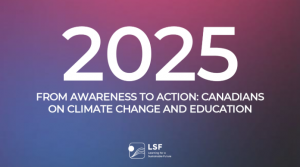- Home
- Tutorial
- Resource Guides
- Focus Areas
- LSF Programs
-
Professional
Development - Review Process
-
A project of LSF

Search for Resources
Climate Change Learning
Climate change is the most complex and wide-reaching challenge facing humankind today. It is essential that we help younger generations to be better equipped to take on this challenge and that we call on their energy, creativity and drive to help us all work towards a common goal. Education is critical to the global and national response to climate change.
Climate change is the most complex and wide-reaching challenge facing humankind today. It is essential that we help younger generations to be better equipped to take on this challenge and that we call on their energy, creativity and drive to help us all work towards a common goal. Education is critical to the global and national response to climate change.
However, the explicit presence of climate change in provincial/territorial curriculum is extremely limited, so it is primarily left to individual teachers to decide if and how to include it, or to individual students to seek out information on their own.
This approach is not effective; LSF’s 2022 “Canadians’ Perspectives on Climate Change and Education” survey found fundamental knowledge gaps in climate change understanding and education among Canadians, including teachers and students. For example, nearly a third of educators report not covering climate change topics in any subject that they teach. Of the educators who do integrate climate change content, most devote only 1-10 hours of instruction to the topic per year or semester. While educators would like to include more climate change education in their classroom, 64% agree that they need professional development to do so better, and there is a need for more climate change teaching resources.A lack of resources for teachers translates to a lack of comprehensive climate change education for students. This knowledge gap is apparent in the survey results: a third of all respondents (and 45% of students) failed a basic climate change knowledge quiz. The need for better climate change information and learning resources is clearClimate change is the most complex and wide-reaching challenge facing humankind today. It is essential that we help younger generations to be better equipped to take on this challenge and that we call on their energy, creativity and drive to help us all work towards a common goal. Education is critical to the global and national response to climate change.
Building on data from 2019 and 2022, Learning for a Sustainable Future (LSF)’s third national survey From Awareness to Action: Canadians on Climate Change and Education tracks how Canadians’ views and expectations around climate change are evolving. The 2025 report highlights shifting public attitudes, current classroom practices, and growing calls for deeper climate learning across Canada. Moving beyond simply measuring awareness, the report provides insight into what’s happening in classrooms today and identifies key opportunities for schools to strengthen climate education and inspire meaningful action.
Findings from the report show encouraging progress among teachers: 47% now feel prepared to teach climate change, up from 34% in 2022. Educators are also dedicating more time to climate-related topics, with 51% spending 1–10 hours per year, compared to 43% previously. More teachers are integrating action projects, solution-focused learning, media literacy, and strategies for emotional resilience into their lessons. Students, meanwhile, continue to express a strong desire to learn more particularly about solutions and how they can take meaningful action in their communities.
Climate change remains a topic that is not consistently addressed in classrooms, even as students express a strong desire for more education especially focused on solutions and meaningful action. To improve climate change education, Canadians point to the need for more support for student-led action projects and greater flexibility in the curriculum to integrate climate topics. Supporting teachers with professional development, resources, and a school culture that values climate learning is essential to ensuring they have the tools and confidence to guide students in becoming informed, empowered, and ready to contribute to a more sustainable future.
LSF is committed to supporting Canadian educators with resources, professional development, and programming that will help them incorporate climate change learning into their teaching in any grade or subject.
Explore the tabs above to get started!

